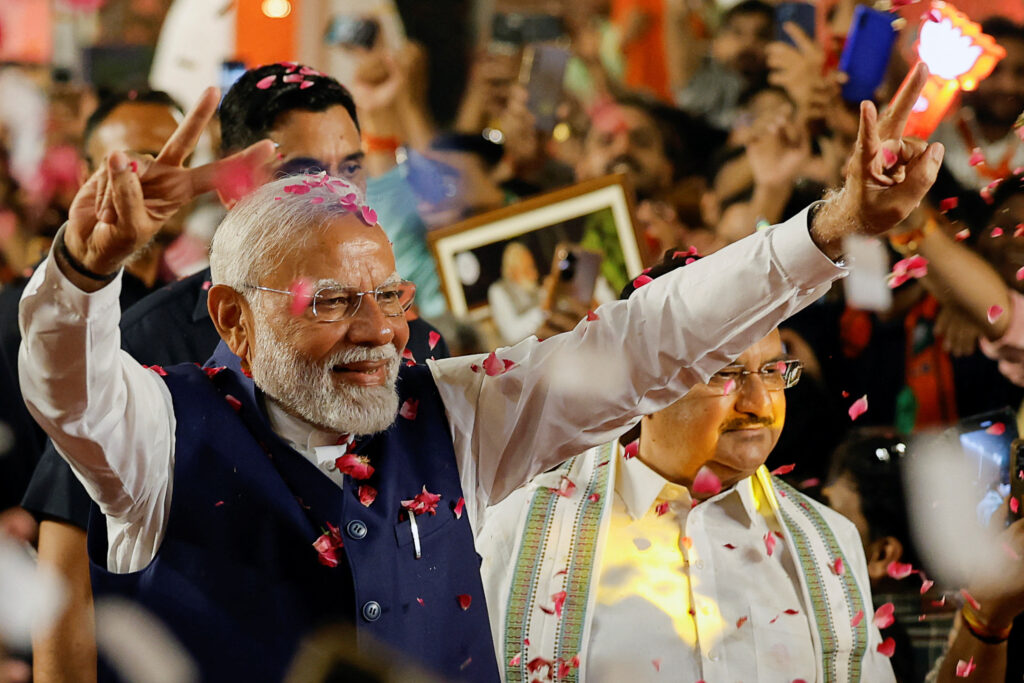On June 8, 2024, Narendra Modi is set to be sworn in as the Prime Minister of India for the third consecutive term, marking a historic milestone in the nation’s political landscape. This upcoming oath-taking ceremony is expected to be a grand event, attended by dignitaries from across the globe, political leaders, and thousands of enthusiastic supporters. Modi’s third term as Prime Minister signifies not only the continued trust and confidence of the Indian electorate but also sets the stage for further transformative policies and initiatives.
The Ceremony
The swearing-in ceremony will take place at the Rashtrapati Bhavan, the official residence of the President of India. The grandeur of the event will reflect the significance of the occasion. President Droupadi Murmu will administer the oath of office and secrecy to Narendra Modi, who is expected to take the pledge in Hindi, reaffirming his commitment to the Constitution of India and the principles of democracy.
The event will be attended by a diverse group of attendees, including members of the Union Cabinet, Chief Ministers of various states, leaders from opposition parties, and notable international guests. Among the foreign dignitaries will be heads of state from SAARC countries, representatives from major global powers, and leaders of various international organizations. Their presence will underscore India’s growing influence and Modi’s stature on the global stage.
The Political Journey
Narendra Modi’s journey to his third term as Prime Minister has been marked by significant achievements and notable challenges. His first term (2014-2019) focused on economic reforms, digitalization, and initiatives like Swachh Bharat (Clean India) and Make in India. The demonetization move and the introduction of the Goods and Services Tax (GST) were pivotal moments that defined his governance style.
In his second term (2019-2024), Modi’s administration faced the unprecedented challenge of the COVID-19 pandemic. The government’s response, which included a massive vaccination drive and economic stimulus packages, received both praise and criticism. Despite the challenges, Modi’s leadership during the pandemic helped consolidate his support base.
The 2024 general elections were fiercely contested, with the Bharatiya Janata Party (BJP) securing a decisive victory, reflecting the continued popularity of Modi’s leadership and policies.
Key Priorities for the Third Term
As Modi embarks on his third term, several key priorities are expected to shape his administration’s agenda:
- Economic Growth and Development: Boosting economic growth remains a top priority. The government is likely to focus on reviving the economy through infrastructural development, increasing foreign investments, and promoting self-reliance under the Atmanirbhar Bharat (Self-Reliant India) initiative.
- Healthcare and Education: Strengthening the healthcare system and improving the quality of education will be critical. The COVID-19 pandemic highlighted the need for robust healthcare infrastructure, and Modi’s administration is expected to continue investing in this sector.
- Digital India: Continuing the digital transformation of India is another key focus area. Enhancing digital infrastructure, promoting digital literacy, and expanding internet access to rural areas are likely to be prioritized.
- Climate Change and Sustainability: Addressing climate change and promoting sustainable development will be essential. The government is expected to advance its commitments under the Paris Agreement and focus on renewable energy sources.
- Foreign Policy and Security: Strengthening India’s position on the global stage and ensuring national security will remain vital. Modi’s foreign policy has aimed at building strong bilateral and multilateral relationships, which is expected to continue with greater emphasis.
Public Reaction and Expectations
The public reaction to Modi’s impending third term has been mixed but largely positive among his supporters. His ability to connect with the masses, his decisive leadership style, and his vision for a “New India” have garnered significant support. However, critics argue that there are areas that require more attention, such as unemployment, agrarian distress, and social harmony.
Expectations are high for Modi to address these issues while maintaining the momentum of economic and social reforms. The electorate’s mandate is a testament to their belief in Modi’s vision and their hope for continued progress and development.
Conclusion
Narendra Modi’s upcoming swearing-in for a third term as Prime Minister of India is set to be a momentous event in the country’s history. It reflects the trust and confidence the Indian electorate has placed in his leadership. As he takes on the mantle once again, the challenges are many, but so are the opportunities. With a focus on economic growth, digital transformation, healthcare, education, sustainability, and a strong foreign policy, Modi’s third term promises to be a defining period in India’s journey towards becoming a global powerhouse. The coming years will be crucial in determining the lasting impact of his leadership on the nation’s future.

